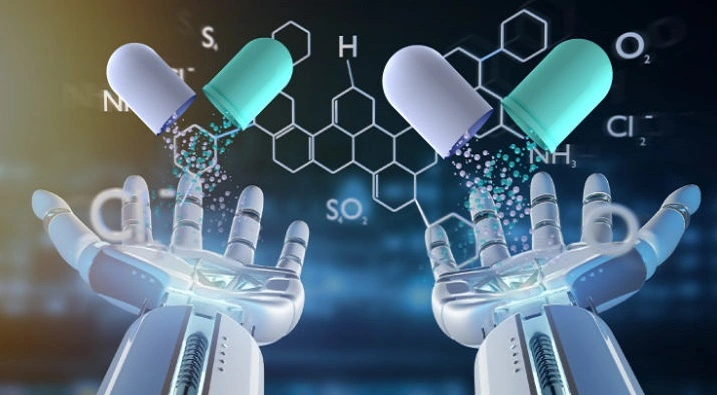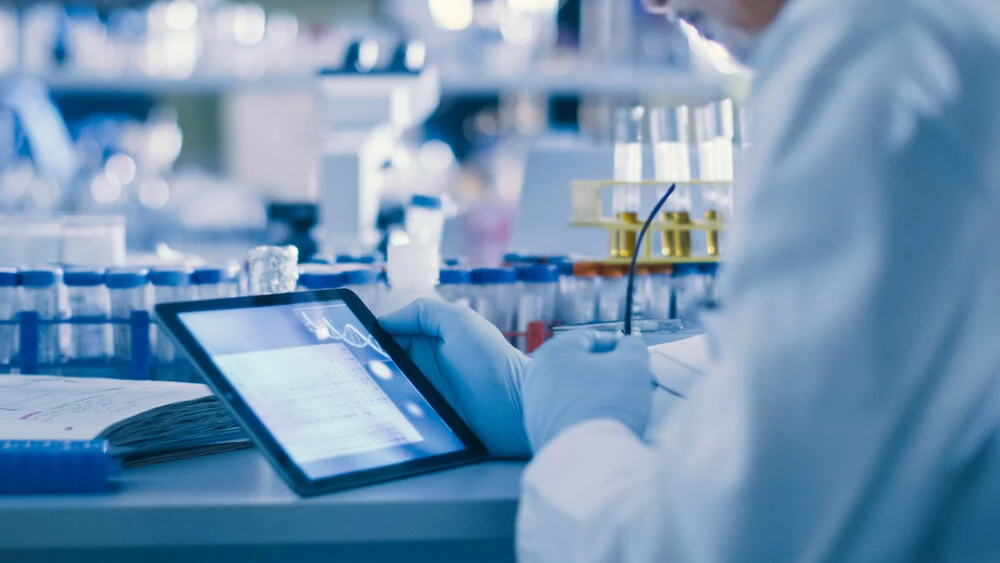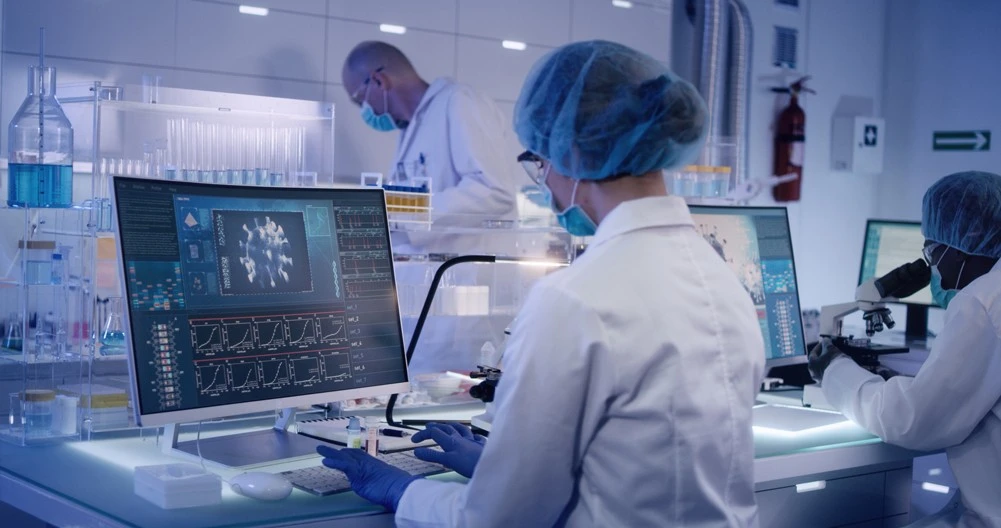In recent years, the convergence of artificial intelligence (AI) and biotechnology has driven scientific advancements to extraordinary heights, promising breakthroughs in healthcare, agriculture, and beyond. Top AI Biotech companies are presenting us with new innovations daily, pushing the boundaries of healthcare and life sciences through groundbreaking applications of artificial intelligence
However, amidst the excitement, it’s crucial to recognize the potential risks associated with the growth of AI Biotech. Without proper supervision and regulation, the future could witness unintended consequences that could have negative implications for society.
What are AI Biotech Potential Pitfalls?
Let’s explore into a comprehensive exploration of what could go wrong if AI Biotech remains unchecked.
1. Ethical Dilemmas in Genetic Engineering
AI Biotech has unlocked the potential for precise genetic editing, raising ethical concerns about manipulating the very fabric of life itself. Without proper oversight, there’s a risk of unethical experimentation, such as the creation of designer babies with enhanced traits, worsening social inequalities and discrimination based on genetic makeup.
Example:
The controversial case of He Jiankui, who used CRISPR technology to genetically modify human embryos, highlighted the ethical quandaries surrounding AI Biotech.
2. Unintended Consequences of Gene Drive Technology
Gene drive technology, empowered by AI, offers the ability to engineer species on a large scale, potentially eradicating disease-carrying organisms like mosquitoes. However, the unintended consequences of altering ecosystems could be catastrophic, leading to unforeseen ecological imbalances and biodiversity loss.
Example:
In 2018, researchers warned of the potential risks associated with releasing gene-drive modified organisms into the wild without thorough risk assessment.

3. Threats to Data Privacy and Security
In current times of data-driven healthcare, The vast amounts of sensitive biological data generated and analyzed by AI Biotech pose significant risks to privacy and security. Without stringent safeguards, there’s a danger of data breaches, unauthorized access, and exploitation of personal genetic information for malicious purposes, including discrimination and targeted marketing.
Example:
The Cambridge Analytica scandal underscored the vulnerabilities of personal data in the digital age, serving as a cautionary tale for the biotech industry.
4. Weaponization of Biotechnology
Advancements in AI Biotech could inadvertently pave the way for the weaponization of biological agents, including engineered pathogens and bioterrorism. Without adequate oversight, malicious actors could exploit emerging technologies to develop bio-weapons capable of causing widespread harm and disruption.
Example:
The potential for bioterrorism was demonstrated in the aftermath of the 2001 anthrax attacks, highlighting the need for robust safeguards against the misuse of biotechnology.
5. Amplification of Health Inequities
While AI Biotech holds the promise of revolutionizing healthcare, there’s a risk that advancements may worsen existing health inequities. Without addressing disparities in access to technology and healthcare services, marginalized communities could be left behind, widening the gap between the haves and have-nots.
Example:
The disparity in access to COVID-19 vaccines highlighted systemic inequalities in healthcare, underscoring the importance of equitable distribution of AI Biotech innovations.
6. Regulatory Loopholes and Oversight Gaps
The rapid pace of technological innovation in AI Biotech outpaces regulatory frameworks, leaving gaps in oversight and accountability. Without adequate regulation, there’s a risk of companies prioritizing profit over safety, potentially compromising public health and environmental protection.
Example:
The FDA’s struggle to keep pace with advancements in gene editing technologies underscores the challenges of regulating rapidly evolving fields like AI Biotech.

7. Unforeseen Consequences of AI Algorithms
AI algorithms play a pivotal role in drug discovery, diagnostics, and personalized medicine within the realm of AI Biotech. However, without transparency and scrutiny, there’s a risk of algorithmic bias, erroneous predictions, and unintended outcomes that could have detrimental effects on patient care and public health.
Example:
The case of IBM’s Watson for Oncology, which reportedly recommended unsafe and inappropriate cancer treatments, underscores the importance of rigorously evaluating AI algorithms in biomedicine.
8. Environmental Risks of Bioengineered Organisms
The manipulation of organisms through AI Biotech techniques such as synthetic biology and gene editing raises concerns about environmental risks. Without thorough risk assessment and containment measures, there’s a potential for unintended ecological consequences, including the spread of genetically modified organisms and disruption of natural ecosystems.
Example:
The escape of genetically modified mosquitoes into the wild highlights the environmental risks associated with bioengineered organisms, underscoring the need for robust biocontainment strategies.
9. Cultural and Social Impacts of Genetic Modification
The widespread adoption of AI Biotech could reshape cultural attitudes towards genetic modification, raising questions about identity, diversity, and the sanctity of life. Without thoughtful consideration of societal values and norms, there’s a risk of cultural upheaval and ethical dilemmas surrounding the boundaries of genetic manipulation.
Example:
The debate over the use of CRISPR technology to edit the genomes of plants and animals reflects broader societal concerns about the implications of genetic modification.
AI Biotech: Solutions to Potential Risks
Addressing the potential risks associated with AI Biotech requires a multifaceted approach that encompasses regulatory measures, ethical guidelines, technological safeguards, and public awareness initiatives.
Here are some solutions to mitigate these issues and ensure responsible development and deployment of AI Biotech:
1. Strengthen Regulatory Oversight:
- Establish comprehensive regulatory frameworks tailored to the unique challenges of AI Biotech, encompassing aspects such as genetic engineering, data privacy, and biosecurity.
- Enhance collaboration between regulatory agencies, scientific communities, and policymakers to adapt regulations to the rapidly evolving landscape of biotechnology.
- Implement rigorous approval processes for AI Biotech products and interventions, ensuring thorough risk assessment and compliance with ethical standards.
2. Foster Ethical Guidelines:
- Develop clear and transparent ethical guidelines for the responsible use of AI Biotech, addressing issues such as genetic editing, data privacy, and social equity.
- Encourage interdisciplinary dialogue and engagement with diverse stakeholders, including ethicists, policymakers, healthcare professionals, and community representatives, to inform ethical decision-making.
- Promote ethical education and training programs within the biotech industry to raise awareness of ethical considerations and foster a culture of responsibility.
3. Enhance Data Privacy and Security:
- Implement robust data protection measures, such as encryption, anonymization, and access controls, to safeguard sensitive biological and personal data generated by AI Biotech.
- Enforce strict compliance with data privacy regulations, such as GDPR and HIPAA, and hold organizations accountable for breaches of data privacy and security.
- Foster a culture of data stewardship and accountability within the biotech industry, emphasizing the importance of responsible data handling practices and transparency with stakeholders.
4. Counter Biosecurity Threats:
- Strengthen global biosecurity measures to prevent the misuse of biotechnology for nefarious purposes, including bioterrorism and biowarfare.
- Enhance surveillance and monitoring capabilities to detect and respond to emerging biosecurity threats, leveraging advances in AI and predictive analytics.
- Foster international collaboration and information sharing to coordinate responses to biosecurity challenges and promote global cooperation in mitigating risks.
5. Promote Health Equity:
- Address disparities in access to AI Biotech innovations through policies and initiatives aimed at improving healthcare access, affordability, and inclusivity.
- Prioritize research and development efforts that target unmet medical needs and underserved populations, ensuring that AI Biotech advancements benefit all segments of society.
- Empower communities through education, outreach, and participatory research initiatives to ensure that the voices of marginalized groups are heard and their health concerns addressed.
6. Enhance Regulatory Agility:
- Foster innovation-friendly regulatory environments that balance safety, efficacy, and accessibility of AI Biotech products and interventions.
- Implement mechanisms for ongoing evaluation and adaptation of regulatory frameworks to keep pace with rapid technological advancements and emerging risks.
- Encourage regulatory harmonization and mutual recognition agreements to facilitate the global exchange of AI Biotech products and knowledge while maintaining high standards of safety and quality.

7. Ensure Algorithmic Transparency and Accountability:
- Require transparency and explainability in AI algorithms used in biomedicine, enabling scrutiny of decision-making processes and identification of potential biases or errors.
- Establish mechanisms for independent auditing and validation of AI algorithms to ensure their reliability, safety, and effectiveness in clinical practice.
- Promote interdisciplinary collaboration between AI researchers, healthcare professionals, and ethicists to develop standards and best practices for responsible AI deployment in biotech.
8. Implement Environmental Risk Assessment:
- Conduct thorough environmental risk assessments prior to the release of genetically modified organisms and other bioengineered products, evaluating potential ecological impacts and implementing appropriate mitigation measures.
- Employ robust containment strategies to prevent unintended spread or proliferation of genetically modified organisms in natural ecosystems, including physical barriers, genetic safeguards, and monitoring protocols.
- Foster interdisciplinary research and collaboration to enhance our understanding of the ecological implications of AI Biotech interventions and develop strategies for sustainable and responsible biotechnology.
9. Foster Societal Dialogue and Engagement:
- Promote public awareness and education campaigns to foster informed dialogue about the opportunities, challenges, and ethical implications of AI Biotech.
- Facilitate participatory decision-making processes that involve diverse stakeholders in shaping the direction of AI Biotech research, development, and deployment.
- Encourage open and transparent communication between scientists, policymakers, industry stakeholders, and the public to build trust, address concerns, and promote responsible innovation in biotechnology.
Conclusion
AI Biotech holds immense promise for addressing some of the most pressing challenges facing humanity, from curing diseases to feeding a growing population. However, the unchecked proliferation of AI Biotech poses significant risks that must be addressed through robust regulation, ethical oversight, and stakeholder engagement.
By proactively addressing potential pitfalls, we can harness the transformative power of AI Biotech while safeguarding against its unintended consequences, ensuring a brighter and more equitable future for all.
Also explore A 2024 Guide to Choosing Between Artificial Intelligence and Data Science as a Career.



